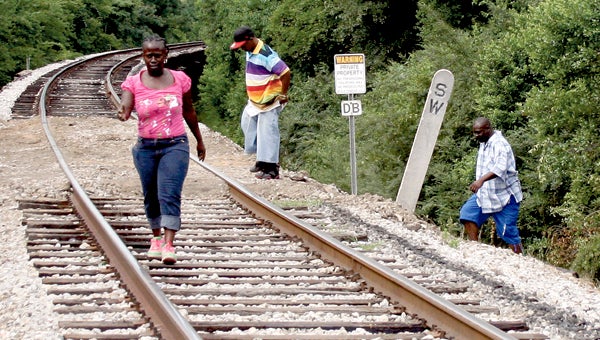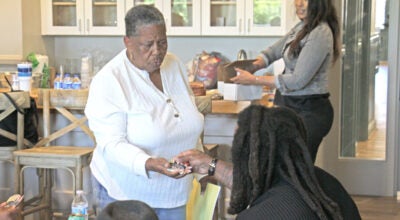Family’s loss among top stories
Published 8:03 pm Wednesday, December 29, 2010

Friends and family members of 17-year-old Tarasha "Pooh" Benjamin search the embankments of railroad tracks around Selma for her. The teenager went missing June 26 and has yet to be found. Her disappearance and the search for her were 2010âs no. 8 story of the year. -- Brian Tynes, Photo
Editor’s Note: The year 2010 is quickly approaching completion. And with the vision of 2011 just ahead this weekend, The Selma Times-Journal wanted to first glance back at the local stories believed to have made the most impact in 2010. Today we unveil the No. 8, 9 and 10 stories on our top 10 list:
For more than 300 issues this year, The Selma Times-Journal has worked to cover the people, the places and the events that go together to make up Selma, Dallas County and the Black Belt.
The stories cover the spectrum from celebrations of significant industrial and economic announcements to the deaths of civic leaders and historical icons.
While the BP oil spill along the Gulf Coast ranks as Alabama’s top story, these selected stories are more focused on our hometowns and our neighbors.
No. 8: Missing: Tarasha “Pooh” Benjamin
The Benjamin family has been searching for missing Tarasha “Pooh” Benjamin for nearly six months. The Selma teen was last seen by her mother Regina on June 26 before she made a trip to the Selma Flea Market.
Her family is still hopeful.
“This is so sad,” said Selma City Councilwoman Angela Benjamin, who led the community search campaign during the summer. “We keep looking.”
Selma Mayor George Evans, Chief of Police William T. Riley III, dive teams, family, friends, members of the community and the Selma and Calera Police Departments passed out fliers in hopes of finding the then 17-year-old. Benjamin’s belongings and an abandoned SUV were found on the Cecil Jackson Bypass.
Benjamin’s family is still praying for her safe return.
“We miss her,” said Rose White, Tarasha’s aunt. “She’s in my prayers and my heart every day.”
No. 9: Jimmie Lee Jackson slaying case
The shooting death of 1965 Civil Rights protester Jimmie Lee Jackson was once a case,unresolved. Not anymore.
Former Alabama State Trooper, James Bonard Fowler pleaded guilty to misdemeanor second-degree manslaughter in early November inside a Perry County courtroom. Fowler was accused of shooting Jackson in the stomach at a civil rights march.
A judge ordered Fowler to spend six months in the Geneva County Jail and serve six months probation.
District Attorney Michael Jackson handled the case for more than three years and was satisfied in the final verdict.
“This plea deal will bring closure and healing in the community,” Jackson said.
No. 10: Voting Rights Museum & Institute gets new building
Change is necessary for growth.
At least that is what Olimatta Taal, interim executive director of the The National Voting Rights Museum & Institute, believes. The institute changed locations from Water Avenue to the base of the bridge in mid-June for a safer structure.
Taal said the change has helped its overall business.
“We have more space for parking, growth and development,” Taal said. “When bigger groups come, we can accommodate them, and this is advantageous.”
Taal added the change doesn’t change what the museum stands for.
“We’re at the foot of the bridge, right where Bloody Sunday took place,” Taal said. “This makes it easier to tell the story of the Voting Rights struggle and make it more visual for people.”
African-Americans celebrated 45 years of voting rights on Aug. 3 and Taal said this achievement benefited the world and other historic movements — like the Berlin Wall falling.
“I’ve always said the struggle in Selma benefited the world,” Taal said. “We want to preserve history and we need as much community support as possible.”
Taal said the museum is making changes to keep up with technology.
“We’ve built a partnership with Tuskegee’s archives to help ‘digitize’ the media and create in-house documentaries to tell the story of the Voting Rights struggle in Marion and Lowdnes counties and Mississippi,” Taal said. “Also, a Congressional grant will help us to be more accessible online to those outside of Selma.”
Taal is asking for the help of the community and volunteers to keep the spirit of the Voting Rights struggle alive.
“We need as much community support as possible,” Taal said. “We need the world to help Selma and to revitalize it.”




